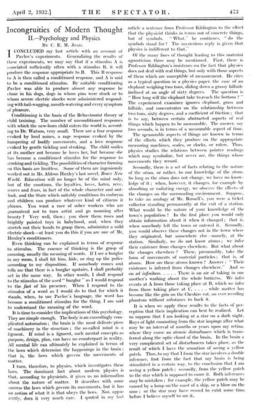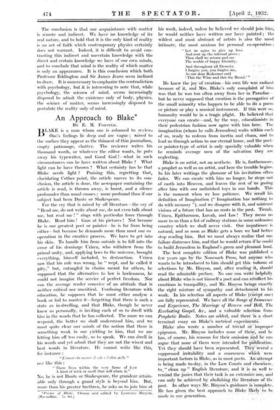Incongruities of Modern Thought
II.—Psychology and Physics By C. EMI. JOAD.
T CONCLUDED my last article with an account of
Pavlov's experiments. Generalizing the results of these experiments, we may say that if a stimulus A is associated sufficiently often with a stimulus 13, it will produce the response appropriate to B. This B response to A is then called a conditioned response, and A is said to be a conditioned stimulus. By suitable conditioning Pavlov was able to produce almost any response he chose in his dogs, dogs in whom pins were stuck or to whom severe electric shocks were administered respond- ing with tail-wagging, mouth-watering and every symptom of .pleasure.
Conditioning is the basis of the Behaviourist theory of child training. The number of unconditioned responses with which the new-born child enters the world is, accord- ing to Dr. Watson, very small. There are a fear response evoked by loud noises, a rage response evoked by the hampering of bodily movements, and a love response evoked by gentle tickling and stroking. The child smiles at its mother not because. he loves her, but because she has become a conditioned stimulus for the response to stroking and tickling. The possibilities of character forming on this basis are limitless. Some of them are ingeniously worked out in Mr. Aldous Huxley's last novel, Brace New World. Education will no longer be of the mind only, but of the emotions, the loyalties, loves, hates, reve- rences and fears, in fact of the whole character and out- look, and the State which suitably conditions its embryos and children can produce whatever kind of citizens it pleases. You want a race of sober workers who arc guaranteed not to turn artist and go mooning after beauty ? Very well, then ; you show them roses and brightly painted toys in babyhood, and, when they stretch out their hands to grasp them, administer is mild electric shock—at least you do this if you arc one of Mr. Hmdey's conditioners.
Even thinking can be explained in terms of response to stimulus. The essence of thinking is the grasp of meaning, usually the meaning of words. If I see a burglar in my room, I shall hit hint, hide, or ring up the police according to my disposition. If somebody comes and tells me that there is a burglar upstairs, I shall probably act in the same way. In other words, I shall respond to the stimulus of the word" burglar " as I would respond to the fact of his presence. When I respond to the stimulus of a word as I would do to that for which it stands, when, to use Pavlov's language, the word has become a conditioned stimulus for the thing, I ant said to understand the meaning of the word.
It is time to consider thcimplications of this psychology, They are simple enough. The body is an exceedingly com- plicated automaton ; the brain is the most delicate piece of machinery in the structure ; the so-called mind is a figment. If mind is a figment, such mental concepts as purpose, design, plan, can have no counterpart in reality. All mental life can ultimately be explained in terms of the laws which determine the happenings in the brain ; that is, the laws which govern the movements of matter.
I turn, therefore, to physics, which investigates these laws. The dominant fact about modern physics is that, according to physicists, it gives us no information about the nature of matter. It describes with some success the laws which govern its movements, but it has no notion of what it is that obeys the laws. Nor, appa- rently, does it very much care. I quoted in my last article a sentence front Professor Eddington to the effect that the physicist thinks in terms not of concrete things. but of symbols. " What," he continues, " do the symbols stand for ? The mysterious reply is given that physics is indifferent to that."
Of the many lines of thought leading to this material agnosticism three may be mentioned. First, there is Professor Eddington's insistence on the fact that physics does not deal with real things, but only with those aspects of them which are susceptible of measurement. He cites as it typical question in a physics paper, the ease of All elephant weighing two tons, sliding down a grassy hillside inclined at an angle of sixty degrees. The question is " How long will the elephant take to reach the bottom ? '! The experienced examinee ignores elephant, grass and hillside, and concentrates on the relationship between two tons, sixty degrees, and a coefficient of friction ; that is to say, between certain abstracted aspects of real things which happen to be measurable. The antswe•. say two seconds, is in terms of a measurable aspect of time.
The measurable aspects of things are known in terms of the effects which they produce on the appropriate measuring machines, scales, or clocks, or rulers. Thus, physics studies the relations between pointer readings which may symbolize, but never are, the things whose movements they record.
Secondly, there is a set of facts relating to the nature of the atom, or rather, to our knowledge of the atom. So long as the atom does not clumge, we have no know- ledge of it ; when, however, it changes, for example by absorbing or radiating energy, we observe the effects of the changes on the surrounding environment. Suppose, to take an analogy of Mr. Russell's, you were a ticket collector standing permanently at the exit of a station. What would be the nature of your knowledge of the town's population ? In the first place you would only obtain information about it when it changed ; that is, when somebody left the town or entered it. Secondly, you would observe these changes not in the town where they originated, but somewhere else—namely, at the station. Similarly, we do not know atoms ; we infer their existence from changes elsewhere. But what about the changes elsewhere '! These, presumably, take the form of nto•etnents of material particles ; that is, of atoms. How arc these atoms known ? Answer : " Their existence is inferred front changes elsewhere." And so on ad infinitum There is an air of taking in one another's washing about the whole business. We infer events at A from those taking place at B, which we infer front those taking place at C while matter has become like the grin on the Cheshire cat, an ever receding phantom without substance to back it.
It is when we apply these results to the facts of per- ception that their implication can best be realized. Let us suppose that I am looking at a star on a dark night. Rays of light emanating from the star impinge after what may be an interval of months or years upon my retina, where they cause an atomic disturbance which is trans- ferred along the optic chord of the brain. In the brain a very complicated set of disturbances takes place, its the result of which I have the sensation of seeing a yellow patch. Thus, to say that I know the star involves a double inference, first from the fact that my brain is being stimulated in a certain way, to the conclusion that 1 ant seeing a yellow patch ; secondly, from the yellow patch to the star which is supposed to cause it. Both inferences may be mistaken ; for example, the yellow patch may be caused by a lamp onkthe mast of a ship, or a blow on the nose ; or the star may have ceased to exist some time before I believe myself to see it. The conclusion is that our acquaintance with matter is remote and indirect. We have no knowledge of its real nature, and to hold that it is the only kind of reality is an act of faith which contemporary physics certainly does not warrant. Indeed, it is difficult to avoid con- trasting this indirect and uncertain knowledge with the direct and certain knowledge we have of our own minds, and to conclude that mind is the reality of which matter is only an appearance. It is this conclusion which both ProfeSsor Eddington and Sir James Jeans seem inclined to draw. It is unnecessary to emphasize the contradiction with psychology, but it is interesting to note that, while psychology, the science of mind, seems increasingly dispoSed to admit the existence only of body; physics; the science of matter, seems increasingly disposed to postulate the reality only of mind.

































 Previous page
Previous page